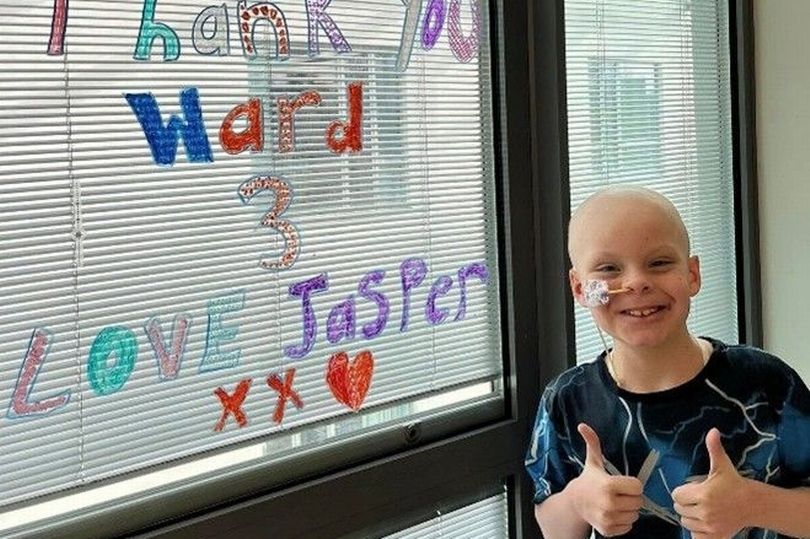
New Swansea parents Sophie and Matt Hodgson-Smith were at a loss when their son Jasper started experiencing health problems when he was merely eight months old.
Even after several tests and being prescribed over 50 bottles of antibiotics, Jasper’s symptoms did not improve, leaving his parents worried. That was until a rare diagnosis was reached years later and Matt was finally able to save his son’s life.
When he was seven years old, Jasper was diagnosed with a rare and life-threatening condition called Activated PI3K Delta Syndrome (APDS) that impairs a person’s immune system, leaving them more susceptible to infections.
- One very painful symptom shows you have new Nimbus Covid
- Full list of Covid symptoms including three unusual ones as new variant reaches UK
Though the family had finally found an answer as to what was wrong with him, the road to being diagnosed was not easy.
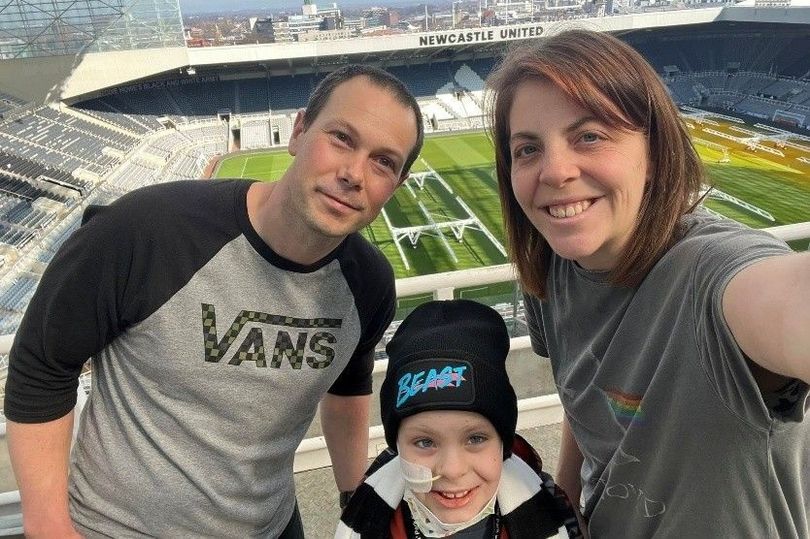
“Jasper started feeling unwell from eight months old and that was the first time that he had to have antibiotics due to a chest infection,” said Sophie. “From then onwards, he had several lots of chest infections along with lots of hospital admissions… like up to six times a year
“Before the age of six he was on 50 bottles of antibiotics… that’s more than I have had during my lifetime.”
Jasper showed a multitude of symptoms like lethargy, persistent high temperatures, and a lack of appetite. Stay informed on the latest health news by signing up to our newsletter here
The experience was especially hard for Sophie and Matt, who were first time parents but the support they received from Singleton was crucial in determining what was wrong with Jasper’s health.
“Being a first-time mum, it is hard to define what is normal and what's not,” said Sophie. “His consultant in Singleton was really good. She had tried every avenue possible, she was a respiratory consultant, and we just pushed for all the tests.”
These were what led to the eventual diagnosis.
“He had the children immunizations booster and his body hadn't made any reaction to the booster,” said Sophie. “So that had alerted that something was incorrect within the blood, so that pushed them for genetic testing.”
Jasper’s condition is so rare that he is the only known child in Wales to be affected with it, while there are only 35 patients across the UK.
The rarity of the condition is what made it hard for Jasper to be diagnosed, and though he had started showing symptoms when he was a baby, it wasn’t until he turned seven that he was diagnosed.
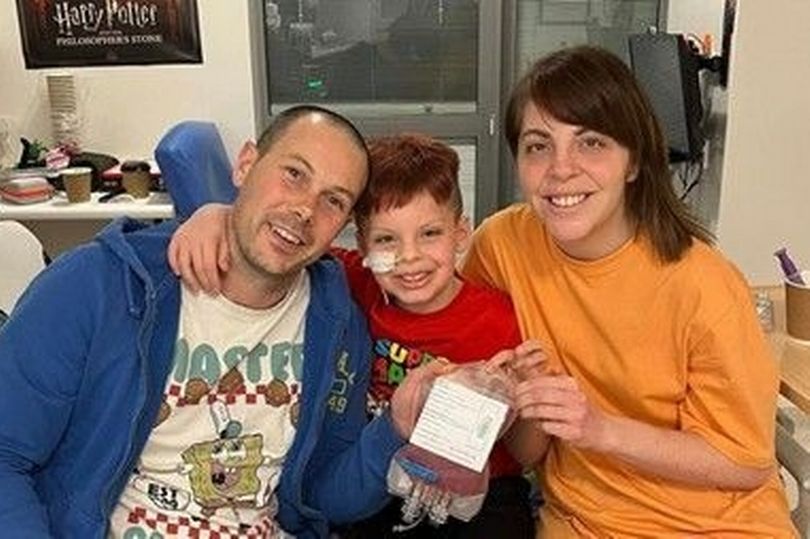
“We knew that was something that wasn't correct,” said Sophie. “We had tried lysis through fibrosis and all the other little things, but genetic testing isn't something that is widely done.
“His condition, APDS, was only found about 13 years ago, so it's still quite new and, it's quite rare, so I think there's lots of rare blood disorders.. and it's quite difficult to narrow it down.”
Though the couple were relieved to finally have answers, there was still a long way to go for Jasper.
“It's good to get an answer. They tried to say that he had bronchiectasis and at the time of being told that, I knew that it wasn't the end,” Sophie said. “You don't have bronchiectasis from nothing. So being told then that he has APDS was quite daunting.
“We walked into a room and it was, I think, six to eight people with professors and nurses and it was just the thought and process, like ‘why are you here, and what are you going to tell me?’”
For those who are affected by APDS, especially young patients, a stem cell transplantation gives a chance to cure the genetic defect. It works by replacing the abnormal immune cells with healthy ones.
“To be honest, I was quite thankful that he had a diagnosis, but then they started talking about the bone marrow transplant,” said Sophie. “That alone…you end up researching everything and it gets quite difficult to comprehend what is going to be coming ahead.”
Jasper went on medication after his diagnosis for a year, but Sophie and Matt knew that a bone marrow transplant was the only cure.
His treatment consisted of recieving several blood and platelet transfusions, immunoglobulin replacement therapy, and chemotherapy to prepare his body for a stem cell transplant.
However, the next big hurdle was finding a donor to match Jasper. The condition is so rare that only one in four patients in the UK are able to find a match from a family member.
Fortunately for the family, Jasper’s father, Matt was identified as suitable match, and the family couldn’t have been happier.
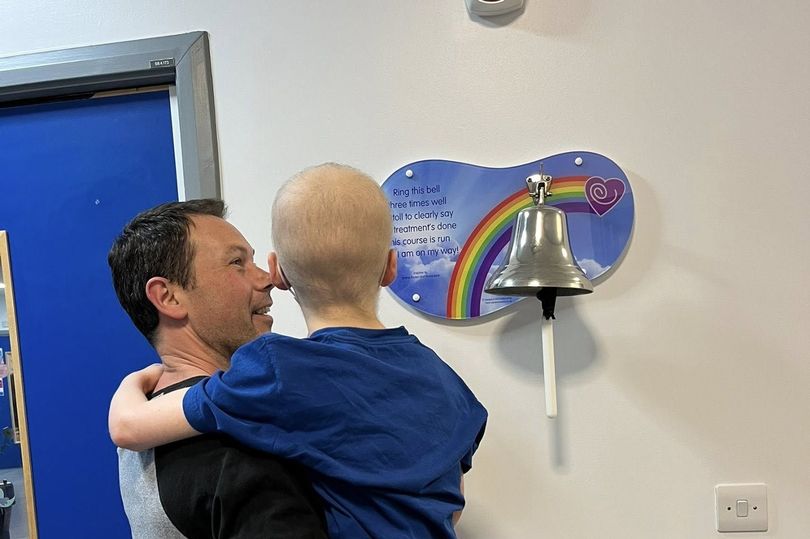
“We were over the moon. We were told that… it should be easy to find a match when actually, it wasn't,” Sophie said. “We had two people who were on the worldwide register who unfortunately couldn't be a match because it wasn’t 100%, so they were unable to use, which led us to no-one.
“We then had Matt’s results back and that was just a huge relief. I didn't realise how little a family member is found, I've only recently found out that only one in four family members are a match.
“So we were quite lucky because when you get told if the dad, or if they've got siblings are not a match, you can be on that register for years or you don't find one at all.”
The couple want to dispel some of the misconceptions about donating blood and stem cells, telling people that the process is much easier than people expect.
"Blood disorders are as life-threatening as cancer and require just as much resilience," Matt said. “Some people think donating stem cells may be painful or invasive. For me, the process was simple. I would do it again in a heartbeat if it meant saving someone’s life.”
Explaining more about the process, Sophie said: “We were so thankful that Matt, his dad, could be a match and it made the process just a bit easier. Jasper, being seven, he got to see his dad have the injections.
“While we were up there five days prior to the transplant, Matt had two injections for five days. He felt like he was doing something for his child and he said he would happily do it again for anyone else.
“It was such an easy process. Something that people, again, have the wrong interpretation, they assume that they’re going to be drugged with the hip bone when actually it's not. He was just put up to a machine. Five days later, it was all drained out of him, ready for Jasper.”
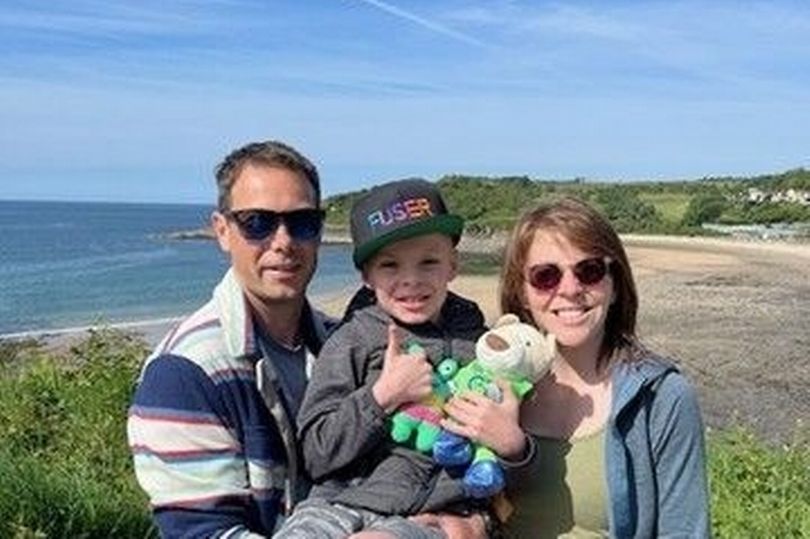
However, for Jasper, who is merely seven years old, the treatment will take time and several hospital vists.
“The whole treatment is around two years, so it's not something that happens overnight and I think that's what people forget,” Sophie said. “People assume, oh you've had it and that's it. So we were up in Newcastle for five months and within that period Jasper was really poorly because obviously he had the chemotherapy so he was quite sick and then afterwards he's still on a restricted food diet.
“He's still on bed isolation so he can't mingle with family and friends, he can't go to school until next January, he can’t go out.
“He really wants fish and chips and he can’t have anything that food wise is prepared by anyone else apart from us as a family. So he's better in himself, but we've still got a long road ahead in terms of instructions.”
Even during the treatment, Jasper has felt sick and had to be hospitalised.
“The whole transplant when you're in… he was in the hospital for seven weeks. Then you think that's the end, you think, oh, you’ve got to the halfway house, but it wasn't,” said Sophie. “Four days later, unfortunately, he got readmitted.
“When we were there for the seven weeks, it was a controlled illness, is how I like to explain it. It was controlled, although he had chemo, we knew what was going on.
“When he was readmitted, it was really scary. He had 40C temperatures for two weeks and we didn't know what was going on. So that was hard because obviously he started losing weight, he was just lethargic, not really engaging much and no one can give us any answers.”
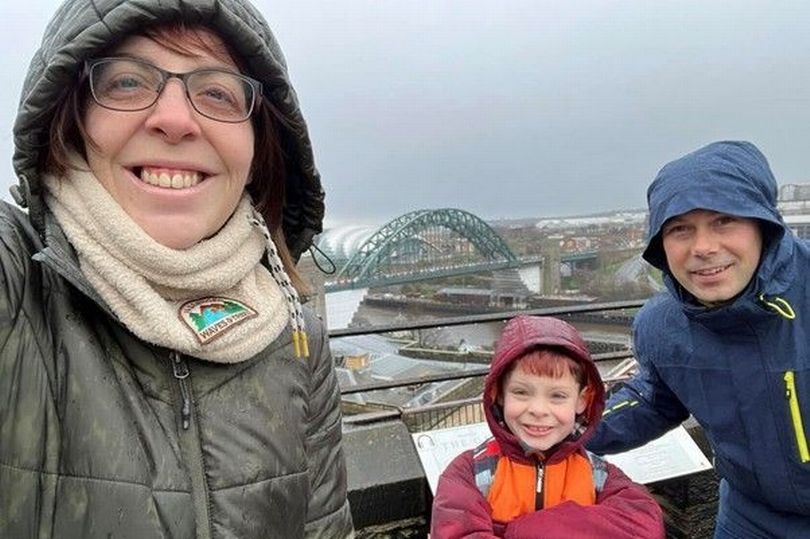
Due to Jasper’s condition being so rare, there are only two places across the UK, that can do the transplant, one being Great Ormond Street Hospital for Children in London and the other being the Great North Children's Hospital in Newcastle, which is where Jasper was.
“We had to spend a long time away from home. Five months away from friends and family and our surroundings was really hard but the support that we had was amazing,” Sophie said. “I couldn't thank his friends in the school, the mums, my family, Matt's family and all our friends, they were just so supportive.
“We had support from three lovely charities in particular, they were really small, one called Louie’s Trust, another called Joseph’s Smile, and another called Morgan's Army, and unfortunately all three of those charities had lost their little boys. So that was really heartfelt.
“In terms of the NHS , between England and Wales, they work quite closely together. The consultant from Newcastle travels down to Cardiff I think like four times a year, so we will see him quite regularly. We don't have to go back up to Newcastle.”
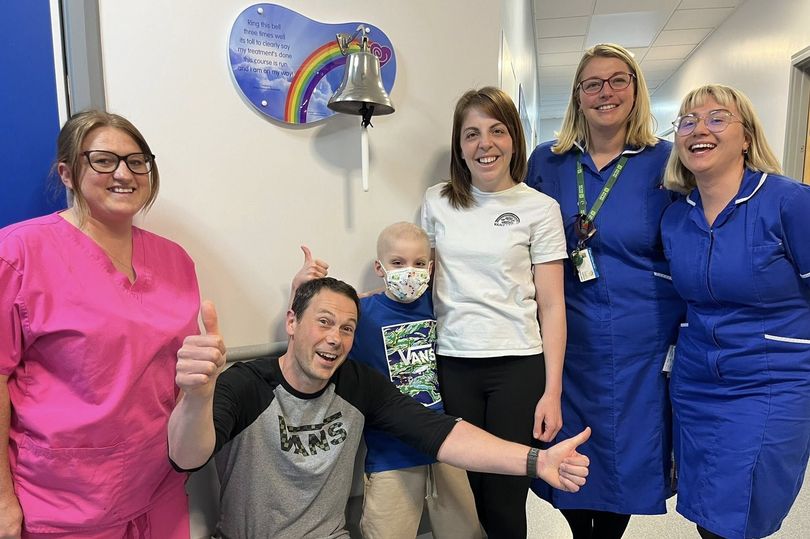
But treatment has not been without impact for Jasper.
“Just before he turned six, that was the time that he started questioning ‘Why me?’, ‘Why am I going to hospital?’, ‘Why I am missing out on school?’, because he wasn't in school for quite a long period of time.
“Once he got told about the transplant, although he's seven, he's got like an old man's head. He's quite wise for his age. He understood it was six months, trying to learn this is going to be the cure…without telling him the complications, he took it on quite well.
“In the six months leading up to it, he knew that he had to be cautious in terms of hygiene and he's been really good throughout it all to be honest.”
Because of her own experience of not knowing what was wrong with her son, Sophie reiterated that she wanted people to realise the importance of blood donation.
“I think I struggled as a first-time mum. I was like 25 years old, I didn't know what was right and wrong, although I felt mother's instinct that something wasn't right, it took us a long time to get a diagnosis,” Sophie said. “I just wanted to make people aware that being on 50 antibiotics before you turn six, it's not normal. So I wanted to share his story and so, just to make people aware.
"Although we were lucky to find a stem cell match through dad, he had platelets while he was up there, and he had blood transfusions, all thanks to the help of others. If it wasn’t for them donating then he would struggle and we don't know where we'd be today.”
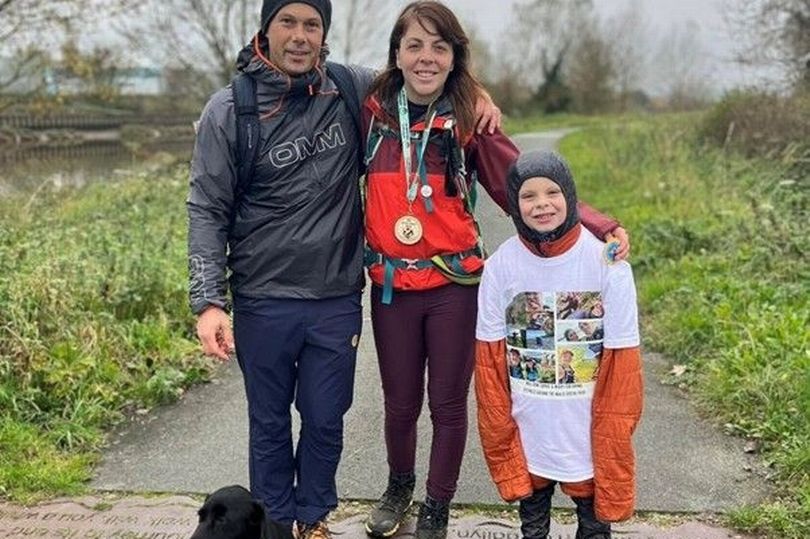
Jasper is now happy to be home, and is expected to start school by January. Once he is fit and well, the family are looking forward to beach walks and more adventures with their dog, Pip.
Welsh Blood Service Director, Alan Prosser added: “Sharing stories like Jasper's highlights the true value of donation and the difference it makes to patients and their families.
"Jasper found a stem cell match within his family, but for most patients, their only hope to receive a stem cell transplant is from an unknown donor.
“We are busy recruiting more people to become blood donors and to join our stem cell registry and this National Blood Donor Week, there has never been a better time to sign up and join our incredible community of lifesavers here in Wales."
If you want to learn more about donating blood, platelets or stem cells, you can do so by clicking here or calling 0800 252 266.
Post a Comment for "Tiny Tot Battled on 50 Bottles of Antibiotics, Family Receives Heartwarming News About Dad"